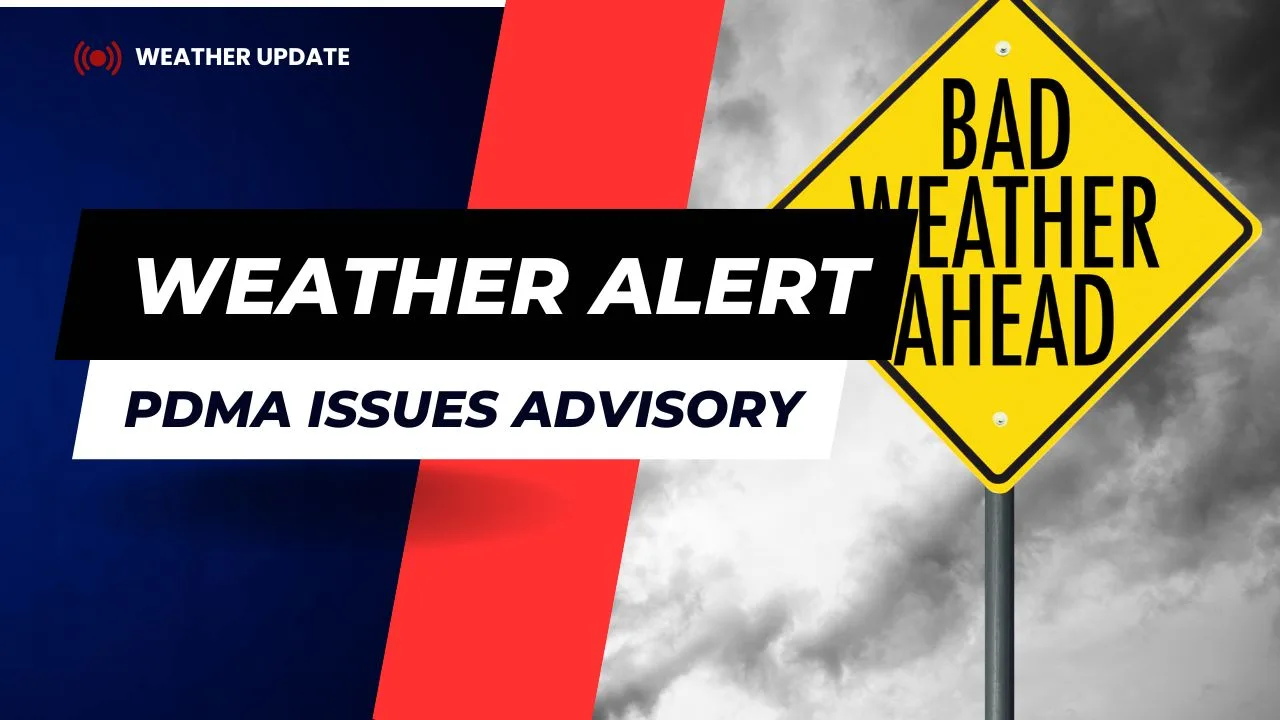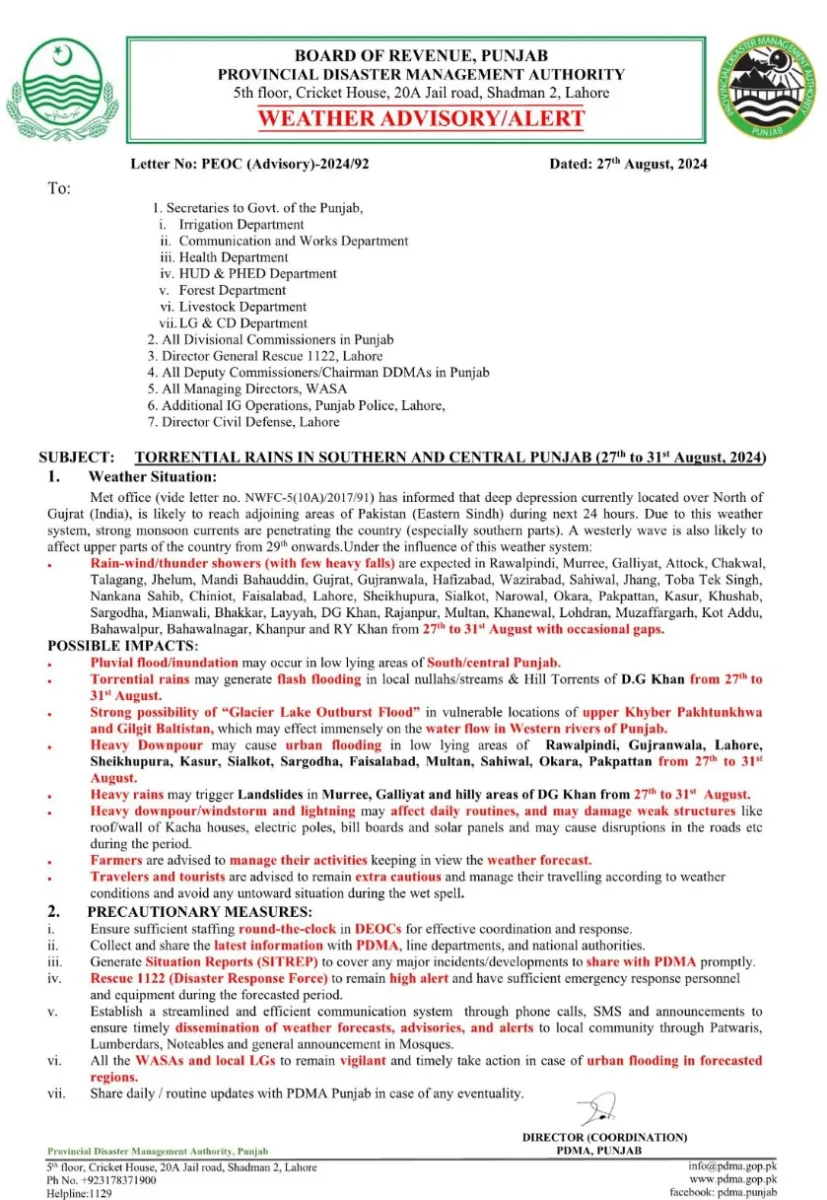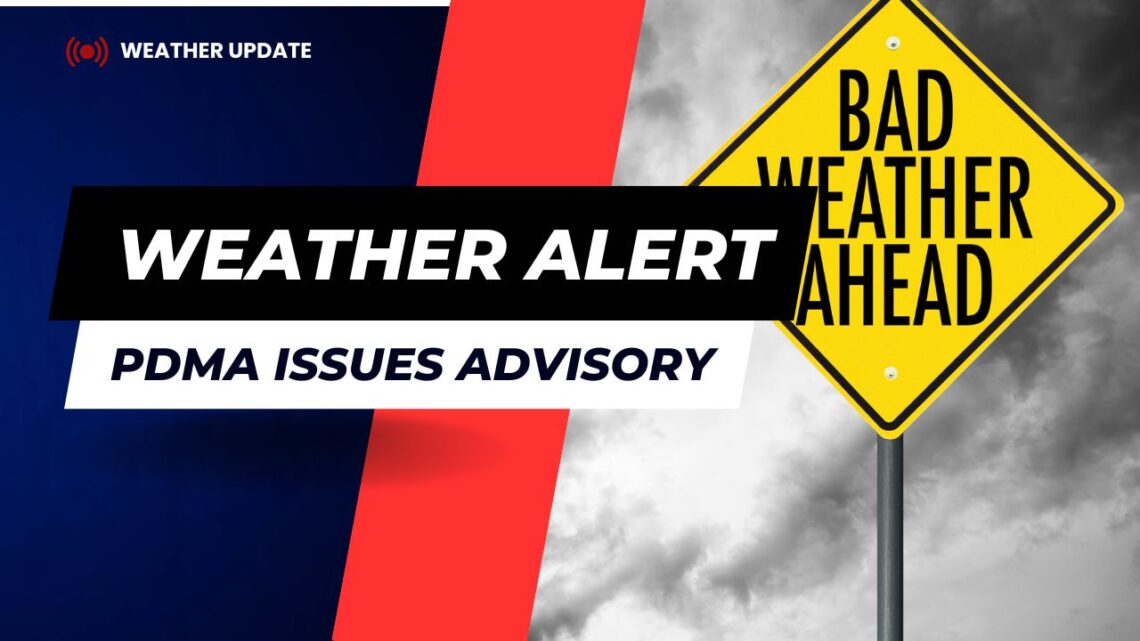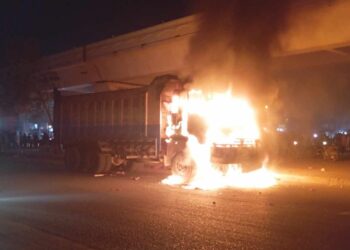LAHORE: The Provincial Disaster Management Authority (PDMA) of Punjab has issued a comprehensive weather advisory, warning of heavy torrential rains expected to hit southern and central regions of Punjab from August 27th to August 31st, 2024.

The advisory follows reports from the Meteorological Office indicating that a deep depression currently positioned north of Gujarat, India, is likely to impact eastern parts of Sindh before extending into adjoining areas of Pakistan, including Punjab.
Weather Situation:
According to the advisory (Letter No: PEOC (Advisory)-2024/92), strong monsoon currents are expected to penetrate the country, particularly in southern parts of Punjab, while a westerly wave may also affect upper regions from August 29th onwards. This combination of weather patterns is anticipated to cause widespread heavy rainfall and thunderstorms across several districts, including:
- Rawalpindi
- Murree
- Galiyat
- Attock
- Chakwal
- Jhelum
- Mandi Bahauddin
- Gujrat
- Gujranwala
- Hafizabad
- Wazirabad
- Sahiwal
- Jhang
- Toba Tek Singh
- Nankana Sahib
- Chiniot
- Faisalabad
- Lahore
- Sheikhupura
- Sialkot
- Sargodha
- Kasur
- Bhakkar
- Layyah
- DG Khan
- Multan
- Khanewal
- Muzaffargarh
- Rahim Yar Khan
The advisory specifically highlights the possibility of pluvial flooding (inundation from heavy rainfall) in low-lying areas, flash floods in hill torrents, and the potential for urban flooding in major cities such as Lahore, Faisalabad, and Rawalpindi.
Possible Impacts:
- Flooding: The advisory warns of potential flooding in low-lying areas of South and Central Punjab due to intense rainfall. Areas around the DG Khan division are particularly at risk of flash flooding from hill torrents.
- Glacier Lake Outburst Flood (GLOF): Vulnerable areas in upper Khyber Pakhtunkhwa and Gilgit-Baltistan are cautioned against the likelihood of GLOF, which could significantly disrupt the flow of western rivers, impacting downstream areas in Punjab.
- Urban Flooding: Cities including Rawalpindi, Lahore, and Sahiwal may experience urban flooding due to the expected heavy downpours, which could overwhelm drainage systems.
- Landslides: The Murree, Galiyat, and hilly areas of DG Khan face a heightened risk of landslides due to the predicted heavy rainfall.
- Disruption to Daily Life: The advisory also notes the potential for severe disruption to daily routines, with heavy rain and winds possibly damaging infrastructure such as kacha houses, electric poles, billboards, and solar panels. Travelers and tourists are advised to exercise extreme caution.
- Agricultural Impact: Farmers in the affected regions are advised to take preemptive measures to protect crops and livestock from the adverse weather conditions.
Precautionary Measures:
The PDMA has outlined several precautionary steps to minimize potential damage and ensure public safety:
- Round-the-Clock Monitoring: All District Emergency Operations Centers (DEOCs) are instructed to ensure 24/7 monitoring and coordination for effective disaster response.
- Enhanced Communication: The PDMA has called for the establishment of a streamlined communication system, using phone calls, SMS, and other methods to disseminate weather forecasts and alerts to local communities, including patwaris, lumberdars, notables, and through mosque announcements.
- Emergency Preparedness: Rescue 1122 and other emergency response teams are on high alert, with essential equipment and resources in place to manage any emergencies that may arise.
- Public Awareness: Local governments and the public are urged to remain vigilant, particularly in urban areas susceptible to flooding, and to avoid unnecessary travel during the forecasted period.
As Punjab braces for what could be a significant weather event, the PDMA’s advisory serves as a crucial reminder for both authorities and the public to prepare for the worst. The ongoing rains could have serious implications for infrastructure, agriculture, and public safety, underscoring the importance of heeding official warnings and taking the necessary precautions to mitigate risks.

The PDMA will continue to provide updates as the situation develops.

















